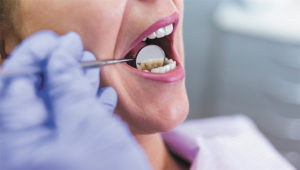 Drug abuse is associated with serious oral health problems including generalized dental caries, periodontal diseases, mucosal dysplasia, xerostomia, bruxism, tooth wear, and tooth loss. Oral health care has positive effects in recovery from drug abuse: patients’ need for pain control, destigmatization, and HIV transmission. Health care systems worldwide deliver services for addicts, but most lack oral health care programs. Barriers against oral health promotion among drug users include difficulty in accessing addicts as a target population, lack of appropriate settings and of valid assessment protocols for conducting oral health studies, and poor collaboration between dental and general health care sectors serving drug abusers.
Drug abuse is associated with serious oral health problems including generalized dental caries, periodontal diseases, mucosal dysplasia, xerostomia, bruxism, tooth wear, and tooth loss. Oral health care has positive effects in recovery from drug abuse: patients’ need for pain control, destigmatization, and HIV transmission. Health care systems worldwide deliver services for addicts, but most lack oral health care programs. Barriers against oral health promotion among drug users include difficulty in accessing addicts as a target population, lack of appropriate settings and of valid assessment protocols for conducting oral health studies, and poor collaboration between dental and general health care sectors serving drug abusers.
While many people who think of drug abuse imagine damage to the lungs, stomach, heart, or brain, many types of drugs damage the teeth and gums. People who struggle with addiction spend a great deal of their time intoxicated on drugs or trying to acquire more drugs; this means that they often neglect oral hygiene because they cannot afford a dentist or they simply stop caring about brushing their teeth.
There are several ways that each drug can, individually, damage oral health. Here are the most common ways that addictive drugs can generally harm the mouth and teeth:
• Dry mouth, which increases acid in the mouth and leads to rotting enamel
• Acid reflux, which also rots enamel and hurts soft tissue
• Grinding teeth
• Loss of blood flow to roots and gums
• Ulcers or sores in the mouth that can become infected
• A focus on attaining more drugs instead of caring for oral hygiene
• Nutritional deficiencies that can damage teeth and gums
• Greater intake of high-sugar food or beverages, which rots teeth
What can you do?
If you or your loved one is suffering from addiction, getting help to become free from the throws of addiction is the first step. An intervention may be necessary and might take several attempts to be successful. Once rehabilitation is underway, along with behavioral therapy, and counseling to support a sober lifestyle, getting to a dentist is imperative to save and salvage the decaying teeth, broken restorations, fractures, periodontitis, and to detect oral cancer.
Dental and oral health care is also beneficial if drug users are still abusing. Prevention and being proactive are essential to saving teeth and staving off dentures or high cost restorative procedures.
To find out ways to get help and become drug free, or to get your loved one the treatment they need, please contact your local or national drug hotline today.
Ocala Dental Care
Ocala Dental Care is a restorative dentist office dedicated to offering exceptional care from dental basics to extensive procedures, all within a warm, inviting setting. They provide comprehensive restorative and general dentistry services to patients, including dental hygiene cleanings, root canals, endodontics, dental implants, dentures, crowns, and full mouth reconstruction.
Members of the FDA and Central Florida District Dental Association, they have been serving patients for more than 30 years and look forward to serving all of your dental needs.
If you or someone you know is concerned about their oral health, or if you need a check-up, please contact Ocala Dental Care today.
2415 SW 27th Ave., Ocala, FL 34471
352-237-6196
www.OcalaDentalCare.com
Check Also
Breakthrough in Neuropathy Treatment: How Summus Laser Therapy Offers Hope for Nerve Pain Sufferers
Neuropathy is a debilitating condition that affects millions of people worldwide, causing chronic pain, numbness, …
 Central Florida Health and Wellness Magazine Health and Wellness Articles of the Villages
Central Florida Health and Wellness Magazine Health and Wellness Articles of the Villages



